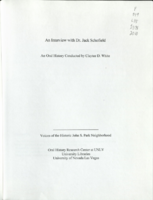Search the Special Collections and Archives Portal
Search Results

Transcript of interview with Elaina Blake by Stefani Evans and Claytee D. White, September 19, 2016
Date
Archival Collection
Description
Coming from humble beginnings, Elaina Blake grew up in Port Orchard, Washington, where her father was in the logging industry and she involved herself in the love of horseback riding. After becoming engaged at age 16, she married the following year at 17 and moved to Las Vegas where she started as a statistical typist at the Sahara Hotel and Casino. This led to a position her to become an executive secretary at the Thunderbird where she dealt with the rampant sexual harassment that was typical of the executive office environment in the industry at the time. The rejection of those advances led her to start her career in real estate with Roberts Realty where she sold her first group of homes off of Nellis Boulevard and Tropicana Avenue. In 1976, she made the entrepreneurial move by buying into Roberts Realty, becoming an owner, and eventually buying out Young American Homes. She started giving back to the community through her service as being the first woman elected to president elect for the Chamber of Commerce in 1984 and also served on the Clark County Planning Commission for four years serving as vice chairman and chairman. She did such a wonderful job running the chamber, she was approached to run for Lieutenant Governor. Her involvement with the community increased during this time as she got involved with the United Way, saved the YMCA from closure and started the Focus School Project in 1989 with former superintendent Brian Cram where businesses adopt schools and provide money and volunteer. This project is still in operation today and has given back $8 million dollars to CCSD in volunteerism. During her time with the Chamber, she continued to work with major local builders such as Pageantry Homes, Heers Brothers, and Christopher Homes, which led to her taking another entrepreneurial milestone by taking a small team to create Blake and Associates. In 1996, Blake leveled up to become a developer starting with office buildings. As a champion for the inclusion of women, she never felt held back because of her gender and she always encouraged women in the Chamber to give more of themselves, even if it was for ten minutes because the men did so. In a male-dominated industry, Elaina Blake has been a trailblazer for women in business and the housing industry in the valley.
Text

Ron Current interview, March 16, 2012: transcript
Date
Archival Collection
Description
Ron Current's heart was always in the right place, with respect to social activism and his dedication to empowering the black community in Las Vegas. Inspired by Black Panther Party founders, Huey P. Newton and Bobby Seale, Ron started the Black Panther Party Las Vegas Chapter. He was also the director of public relations for the National Alliance Against Racist and Political Repression; an organization created to work in tandem with the National Association for the Advancement of Colored People, NAACP, to eliminate racial inequality. Ron describes the overall atmosphere of the Westside community in Las Vegas during the early days, as chaotic, drug infested, and riddled with daily gang related shootings. He also recalls the historic preservation attempts made by leading members of the Westside community, such as Sarann Knight Preddy. Ron recalls working at the University Medical Center while recruiting for the Black Panther Party Las Vegas Chapter. This interview demonstrates the power of love. As the founder and leader of the Black Panther Party Las Vegas Chapter, Ron was named one of the most influential blacks in Las Vegas by the Sentinel Voice. He recalls utilizing his hands-on leadership approach towards capacity building and the successful implementation of community mobilization strategies and methods. He was a champion for educational equity, equal access to employment opportunities, and economic equality in Las Vegas, Nevada.
Text

Transcript of interview with Dr. Jack Lund Schofield by Suzanne Becker, January 13, 2009
Date
Archival Collection
Description
In the dusty border town of Douglas, Arizona, Dr. Jack Lund Schofield was born in the family home in 1923. Due to the economic woes of the Great Depression, the Schofield family moved several times until 1937—the year that Jack's father took a position as a tungsten broker and moved his family of five children to Nevada. For Jack, who was ready to start high school, the move from Phoenix to Las Vegas with a small population of 5000 was a shock. However, it did not take the gregarious Jack long to make friends at Las Vegas High School. He played sports and was a Golden Glove boxing champion. As Jack's high school years drew to an end, two major events occurred: he met his future wife and World War II began. He proudly highlights his service as a fighter pilot in both WWII and the Korea conflict, his family genealogy, and his devotion to being an excellent educator, businessman, family man, and politician. In 1995, he earned his doctorate in education at the age of 72. His resume includes being an elected official, serving on the Board of Regents and having a middle school named after him. Jack and his wife, Alene, have resided in the John S. Park Neighborhood for over 50 years and describes his affection for the neighborhood and some of the changes that have occurred.
Text

Transcript of interview with F. Andrew Taylor by Claytee White, September 30, 2013
Date
Archival Collection
Description
F. Andrew Taylor has been a Las Vegas resident for over 20 years, moving to the city by way of New England and Georgia at the age of 28. Armed with a degree in painting from the Swain School of Design, got a job at a Laughlin casino as a caricature artist. After a brief stay in Laughlin and Bullhead City, Andrew moved to Ward I, where his girlfriend, now wife, lived. They soon moved to the Spring Valley area, where Andrew later learned through conversations with neighbors and his own research that the home sat on what was the old Stardust Racetrack. With Andrew’s move to the city came new professional opportunities. He got a job at CityLife as the in-house artist and graphic designer, what was then apart of Wick Communications. After a year, Andrew began reporting, initially working for the Sunrise/Whitney paper, and eventually working the downtown beat. Always feeling the pulse of the local arts and culture scene, he has attended First Fridays since it started, continues his own art,
Text

Transcript of interview with Kim Krantz by Joyce Marshall, February 26, 1996
Date
Archival Collection
Description
Kim Krantz arrived in Las Vegas in 1953. She came as a seasoned performer having danced in large productions in Chicago, Montreal, New York and Florida. Born Delores Kalcowski in Jersey City, New Jersey, she adopted the name Kim Perrin while working at New York’s Latin Quarter. She had always loved the West and jumped at the chance to take the Latin Quarter show from New York City to Las Vegas. She came for a two-week engagement at the Desert Inn Hotel. The show was held over at that property for three months, and then it moved to the Riviera Hotel and Casino. Bill Miller approached her to join a new production at the Dunes Hotel. He and Harold Minsky were preparing “Minsky’s Burlesque,” the first show to use women born in the United States in a nude show. She opened with the original cast and stayed for two years. Kim retired in 1957 after she married Danny Krantz, the Food and Beverage Manager for the Flamingo Hotel. She raised four children in Las Vegas, but never lost touch with th
Text

Louis Richardson interview, July 29, 2016: transcript
Date
Archival Collection
Description
As a youth, contractor Louis Richardson followed opportunities that would take him across the U.S. and to Sierra Leone, Africa. Originally from Charleston, South Carolina, Richardson attend Hampton Institute, in Hampton, Virginia, a historically black college/university (HBCU); there, he majored in construction and engineering and joined the Reserve Officers' Training Corps (ROTC). After graduation and U.S. Army service in Vietnam, he received an offer from U.S. State Department to teach young adults math and construction in West Africa. That experience led him to work for various Housing Authorities in New Jersey, Los Angeles, and finally, in 1978, to Las Vegas. In this interview, Richardson talks about how his early experiences shaped his vision of the types of projects he would undertake. He speaks about his focus on engineering how he came to Las Vegas and of the public works projects in schools, parks, and libraries that came to define his body of work. He explains the bid proces
Text

Transcript of interview with Robert Brown by Ian McLaughlin, February 23, 1981
Date
Archival Collection
Description
Text

Transcript of interview with Priscilla Scalley by Claytee White, July 24, 2014
Date
Archival Collection
Description
Priscilla and Joe Scalley arrived in Las Vegas in 1972 with their two young daughters. Joe had just completed his residency in radiology and came to Las Vegas to practice at Sunrise Hospital, where he eventually became Southern Nevada’s first neuroradiologist. The couple took out two mortgages to buy their house at 2900 Justice Lane, in the Rancho Nevada Estates section of Ward 1. They were the second owners of the house, which had been built in 1967. In 1993, after their daughters had graduated from high school, the Scalleys sold the house and moved to Summerlin. Joe Scalley died in October 1994. After Joe died Priscilla became reacquainted with and married the father of one of her daughters’ childhood friends, Joel Jobst, who was also widowed. Joel was a nuclear physicist retired from the Nevada Test Site. Priscilla and Joel bought a vacation home in Montana, where they spent every summer. They celebrated 13 years of marriage before Joel passed in 2013. As a young mother Priscilla joined the West Charleston Elementary School Parent Teacher Association and eventually became president. She helped found the Friends of the Libraries when the Clark County Library District had only two libraries—Flamingo Library and West Charleston Library—and served as that group’s president. She also was active in Junior League of Las Vegas and was president 1983?84. In her early forties Priscilla became a travel agent, a career that kindled a passion for travel that still burns brightly. She also is interested in genealogy. Although she has traveled the world she yearns to take her daughters, sons in law, and grandchildren to Ireland, the land of her ancestors.
Text

Transcript of interview with Billy Paul Smith by Claytee White, October 3, 2013
Date
Archival Collection
Description
Chemist, mathematician, and health physicist Billy Paul Smith donates time to tutor young people in hopes of attracting more youth into the fields of math and science. Born in 1942 and schooled in segregated black schools in Shreveport, Louisiana, and Texarkana, Texas, he graduated from high school at age fifteen and enrolled at Prairie View A&M University, where he trained with the Reserve Officer Training Corps (ROTC) and earned his Bachelor’s degree in chemistry and in 1964 his Master’s degrees in chemistry and math. Most young U.S. Army officers in 1964 went to Vietnam, but Billy’s math and science background steered him to the Army Chemical Corps, where he was quickly selected to join a new team. The team was to develop responses to nuclear weapon accidents and worked under the Defense Atomic Support Agency (DASA) in Albuquerque, New Mexico. At the same time, Billy completed the Weapons Ordinance Army course on classified information relating to the U.S. nuclear weapons arsenal. In this interview, Billy talks about his service with DASA and his subsequent twenty-seven years working at the Nevada Test Site in a variety of positions with Reynolds Electrical and Engineering Company, Inc. (REECo), a company that had “percentagewise more blacks in management positions than any other [Las Vegas] company.” He experienced the quiet racism of Las Vegas residential segregation when he tried to purchase a house in a neighborhood he liked and the unexpected kindness of the REECo general manager, Ron Keen, who made sure the Smith family could live where they wanted to live. He talks about Area 51 and explains underground testing activity and offers the scientific and ecological reasons why scientists deemed Yucca Mountain safe to store nuclear waste. After retiring at fifty-two, Billy and a colleague formed an independent instrumentation company, which, from 1995–2005 provided and calibrated radiological measurement and detection instruments for the decommissioning and closure of the Rocky Flats nuclear plant in Golden, Colorado. During that time, Billy rented an apartment in Boulder, but he and Jackie maintained their Las Vegas home, where they still reside. Billy shares memories of places he and his wife used to enjoy on the Westside and tells of their longtime friends in the black community. He also talks about developing his philosophy of philanthropy through Alpha Phi Alpha Fraternity and discusses becoming a member of the Knowledge Fund Advisory Council for the Governor’s Office of Economic Development (GOED) and the advisory council for the Nevada System of Higher Education.
Text

Transcript of interview with Bobby Morris by Barbara Tabach, March 24, 2016
Date
Archival Collection
Description
In this interview, Morris reflects upon his career and the wide range of influential artists he has worked with, as a drummer, musical director and talent manager. Stories include playing with Louis Prima, live and on albums; serving as Elvis? musical director; filling in for Frank Sinatra?s drummer; entertaining Howard Hughes; and playing at President John F. Kennedy?s inauguration, to name a few. He also talks about his agency, attributing its success to the strong relationships he built with casino management.
Text
